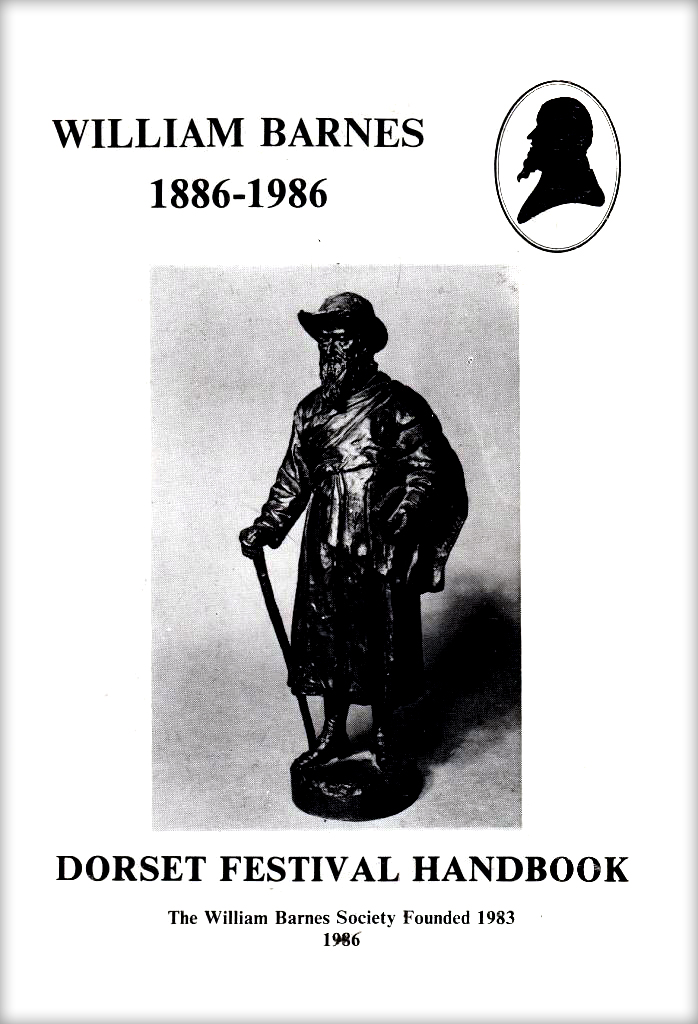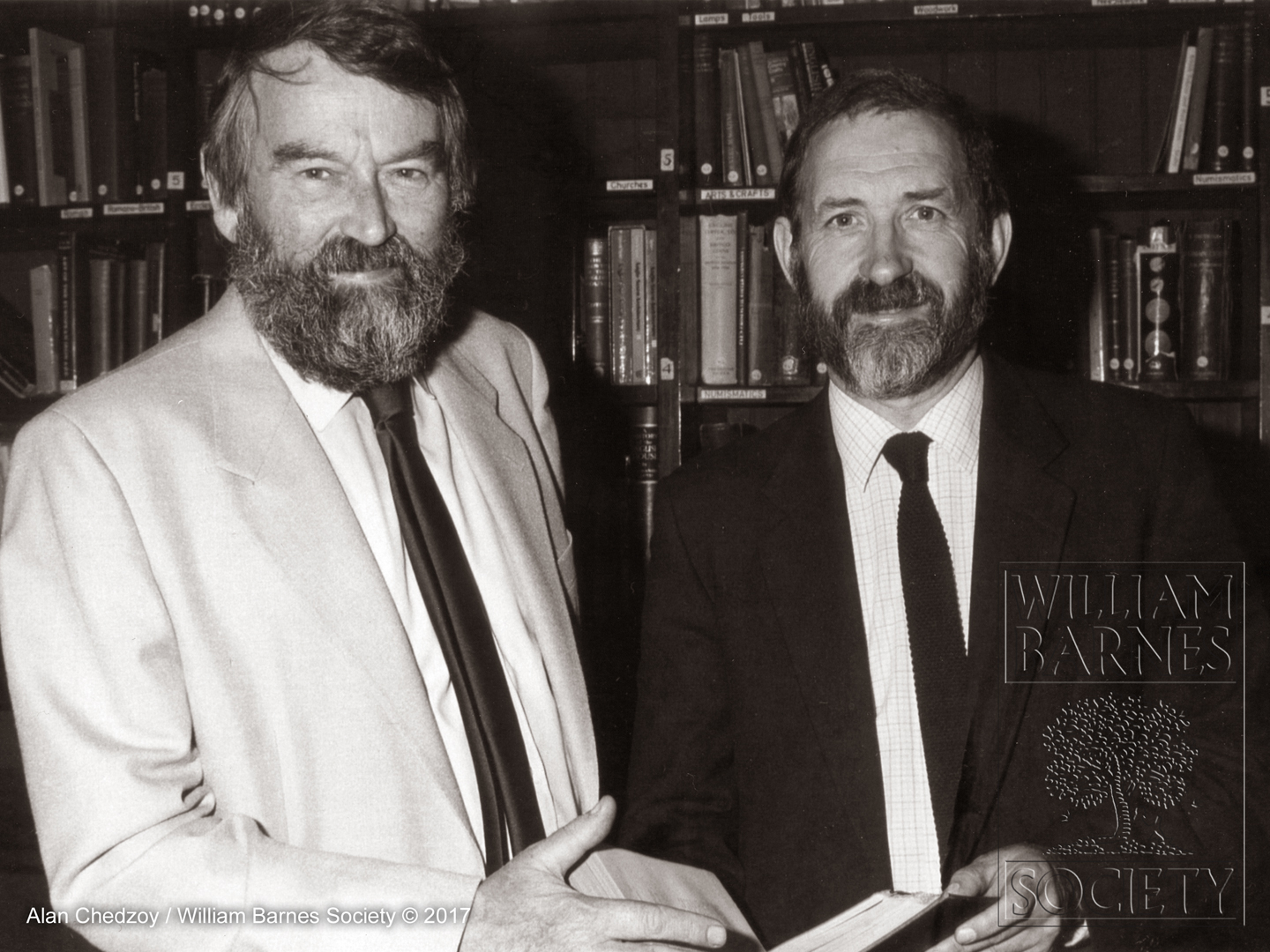History of the William Barnes Society
By Dr. Alan Chedzoy
It was in the early 1980s that I became seriously concerned that the centenary of the death of William Barnes, in 1886, might pass without notice in Dorset. I had been involved with his work for some years, having re-edited Giles Dugdale's anthology of the Poems Grave and Gay in 1978, and was about to publish the first biography of Barnes to appear in thirty years.
Accordingly, I wrote to the Dorset Evening Echo to enquire whether there were others who shared my concern. A brief correspondence resulted in a meeting being called of interested parties. I cannot remember where it took place, in a cottage outside Dorchester I think, but it was there, in 1983, that I first truly understood how much affection there was for Barnes among some Dorset people.
There it was agreed that we should attempt to launch a Festival in the anniversary year. I was appointed Chairman, and the Head of Broadwey School in Weymouth, the late Fred Langford, was to be Secretary. As editor of the Dorset Yearbook, Fred already had many useful contacts. Douglas Ashdown who had been an accountant for the County Council, made up the triumvirate, as Treasurer.
 Looking through the Festival handbook, I am still amazed at our courage or perhaps our foolhardiness. It was decided a Festival should be based in Dorchester, Sturminster Newton (Barnes's home town) and Mere. We planned two weeks of events including talks, walks, church services, a sale of books by Hy. Dukes of Dorchester, music by the Hambledon Hopstep Band, slide and film programmes, 'Dear Mr Barnes', a romantic play mounted by the Dorchester Dramatic Society, and various Dorset evenings.
Looking through the Festival handbook, I am still amazed at our courage or perhaps our foolhardiness. It was decided a Festival should be based in Dorchester, Sturminster Newton (Barnes's home town) and Mere. We planned two weeks of events including talks, walks, church services, a sale of books by Hy. Dukes of Dorchester, music by the Hambledon Hopstep Band, slide and film programmes, 'Dear Mr Barnes', a romantic play mounted by the Dorchester Dramatic Society, and various Dorset evenings.
Fred Langford was still busily working as a head-teacher and we urgently needed extra help with the profusion of correspondence that the Festival was generating. Fortunately, Jill Bryant came forward to act as Hon. Treasurer and Festival Secretary. I shall always be grateful to her for that. By now the ad-hoc committee had evolved into a proper society to be known as 'The William Barnes Society (1983)'. It was necessary to append the date in our title, to protect us from any financial claims that might have attached to a previous (now defunct) society of that name which had its life in Sturminster in the 1950s.
And we might well have generated our own debts because at the time of planning the Festival we had absolutely no money. In the event of failure, all the cost of hiring halls together with other expenses would have had to be borne by committee members. We dreaded the thought of empty halls. How could we be sure that anybody would turn up? Then I had the idea of asking a celebrity if he would come. In the eighties, the novelist John Fowles was one of the most celebrated writers in the world. He was specially famous then in Dorset, where a film of his book, The French Lieutenant's Woman, had just been made. The film-makers had created much work in Lyme Regis and there is still evidence of those days in some High Street shop fronts.

during the 1986 William Barnes Festival
I had had contact Fowles previously and I knew he was a Barnes enthusiast. And so I wrote to him asking if he would like to come and speak at the Festival. He agreed. I well remember the evening in the Dorset County Museum when I introduced him. We needed to have had no forebodings. The audience came flocking in at £5 a head. Fowles spoke on William Barnes: One Hundred Years After. I cannot remember anything of what he said, nor did it matter much. I must admit that not all of his listeners were particularly interested in William Barnes. Many had come simply to clap eyes on the famous novelist. Afterwards, when I tentatively raised the question of his fee, John was generosity itself. He declined to take anything. The result was that we made a significant profit.
Nor need we have worried about the other events which, in Mere, Kingston Maurward, Hinton St Mary, the Blackmore Vale and Whitcombe as well as Dorchester and Sturminster, pulled in the crowds. We ended up with an overall profit of about £5,000. This means that the Society had a 'float' which made it financially secure. We have a great deal to thank the late John Fowles for.
After the Festival there was, as might be expected, a bit of a lull. And when the Committee met again I half expected that it would be agreed that we should disband ourselves. No such thing! Members were insistent that the interest generated should be kept up. So we devised the programme for the following year. That was 32 years ago and still the Society flourishes.

Starts 09:00
Barnes Night: A Celebration of the Life and Work of William Barnes

Starts 09:00
A Dorset Spring through the Poetry of William Barnes

Starts 00:00
Friends Beyond - Barnes, Moule and Hardy

14:30 till 15:30
Talk on William Barnes, Dorset Poet

17:00 till 17:30
Wreath Laying at the William Barnes Statue

Starts 00:00
William Barnes Harvest Celebration

